Overview
The article titled “10 Highlights from the Las Vegas Technology Convention” underscores pivotal innovations and discussions that surfaced during the event. It emphasizes the transformative impact of technology in healthcare, particularly through advancements in AI and data analytics. These innovations are enhancing patient care and operational efficiency, as evidenced by various case studies and expert insights shared at the convention. By showcasing these developments, the article invites readers to explore the significant role of technology in shaping the future of healthcare.
Introduction
In the rapidly evolving landscape of healthcare technology, the recent Las Vegas Technology Convention illuminated the transformative power of data-driven insights, particularly those derived from Medicare analytics. CareSet, a leader in healthcare analytics, showcased how meticulous analysis of over $1.1 trillion in annual claims data can uncover critical treatment patterns and enhance patient care. This compelling statistic underscores the significance of leveraging comprehensive data to drive strategic decision-making and foster meaningful advancements in patient care.
The convention served as a dynamic platform where industry visionaries discussed the role of artificial intelligence, innovative startups pitched groundbreaking solutions, and networking opportunities flourished, all emphasizing collaboration as a catalyst for change. As healthcare organizations navigate the complexities of technology compliance and seek to improve patient outcomes, the insights shared at this event are pivotal in shaping the future of healthcare.
CareSet: Transforming Healthcare Analytics with Medicare Insights
CareSet has revolutionized medical analytics by delivering profound insights derived from Medicare information. By meticulously analyzing over $1.1 trillion in annual claims data, CareSet empowers stakeholders to uncover treatment patterns, identify gaps in care, and effectively map individual journeys. This data-oriented approach not only enhances client care but also equips pharmaceutical firms and medical organizations with the insights necessary for informed decision-making. At the Las Vegas Technology Convention, CareSet showcased its innovative methods, illustrating how comprehensive Medicare knowledge can significantly enhance medical outcomes and drive strategic growth for its partners.
The integration of over 100 external information sources enriches the depth of analysis, ensuring that clients receive timely and relevant findings that lead to impactful results in patient care. For instance, the case study on the oncology treatment producer highlights how CareSet’s analysis facilitated prompt communication with healthcare providers regarding treatment options for Gastrointestinal Stromal Tumor (GIST). As independent consultant Anthony Damico noted, “Enrollment data is only provided for plan-county combinations that have at least 11 beneficiaries,” emphasizing the critical role of accurate data in Medicare analytics. Furthermore, the End-Stage Renal Disease Quality Incentive Program illustrates how performance-based adjustments can motivate facilities to enhance care quality.
With recent enrollment declines in Centene, comprehending these trends is vital for navigating the current Medicare landscape. Pharmaceutical market access managers should leverage this information to refine their strategies and improve patient outcomes. Consider how integrating these data-driven insights can empower your decision-making processes.
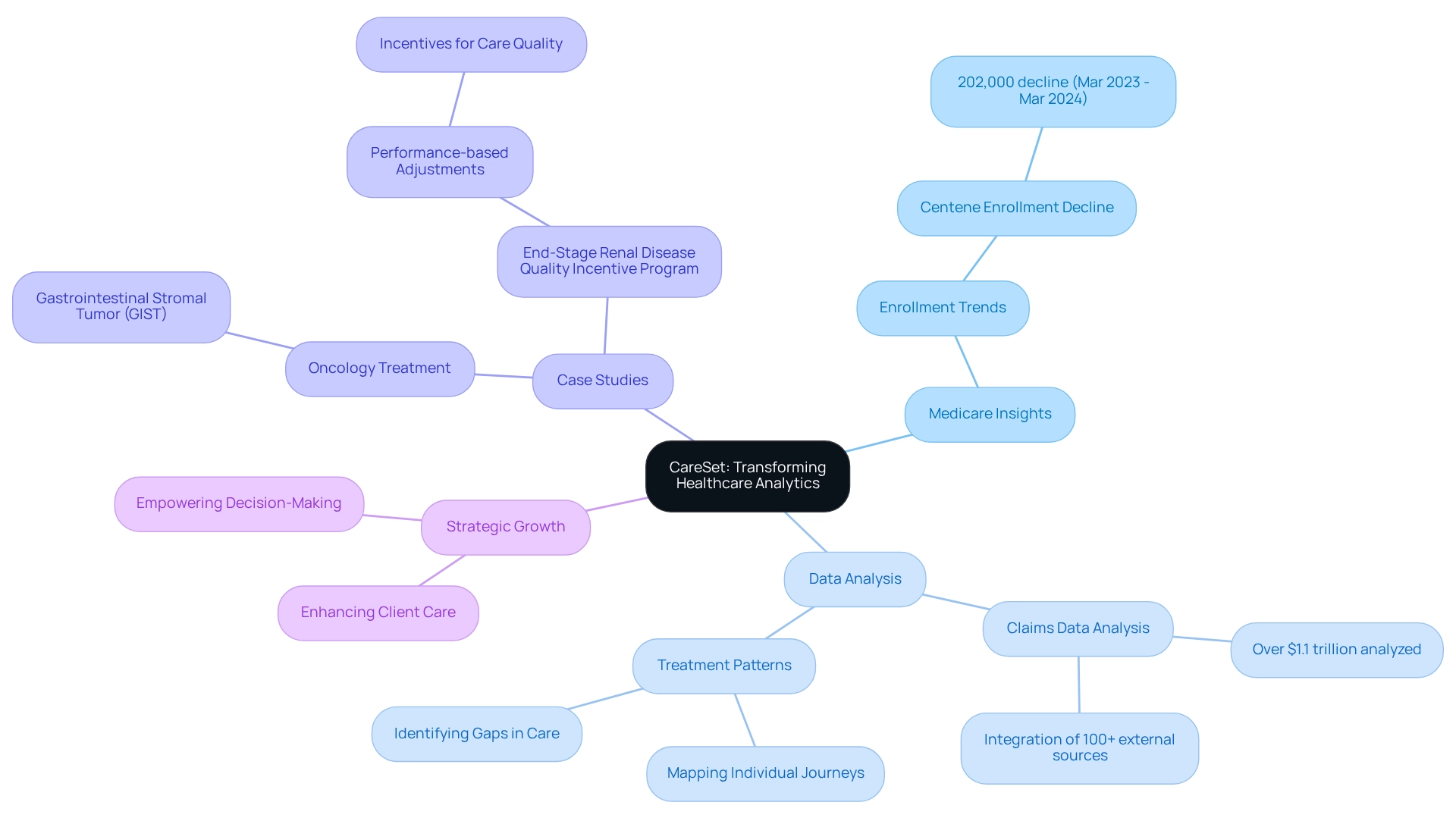
Keynote Speakers: Visionaries Shaping the Future of Technology
The Las Vegas Technology Convention highlighted a remarkable array of keynote speakers, featuring prominent figures from the AI, medical, and technology sectors. These thought leaders shared their insights on the future of technology, emphasizing the essential role of innovation in enhancing care for individuals and improving operational efficiency. Among the notable speakers were executives from leading tech firms and medical organizations, who explored the integration of AI in medical analytics. They highlighted how AI is poised to transform client interactions and optimize medical operations, with statistics revealing that 78% of users reported a better understanding of their lab results through AI-driven explanations. This focus on AI’s transformative potential reflects a broader trend in medical technology, where the emphasis is shifting towards data-driven solutions that enhance decision-making and patient outcomes.
CareSet’s extensive analysis of Medicare information was also a central theme, demonstrating how these findings enhance medical strategies and foster interaction with healthcare providers, particularly regarding oncology treatment alternatives. Furthermore, Conor Stewart noted that while this text offers general information, it is crucial to consider the thoroughness and reliability of data in health analytics. The insights shared by these visionaries at the Las Vegas technology convention not only illuminate current trends but also pave the way for future innovations in the medical field. A pertinent case study presented was from the NHS Aneurin Bevan Health Board, which implemented automation to connect individual data for tracking COVID-19 vaccinations, showcasing a practical application of AI that improved operational efficiency.
Moreover, as we look ahead, it is essential to recognize the primary issues surrounding AI in medical services for 2024, which highlight the challenges that must be addressed as the sector progresses.
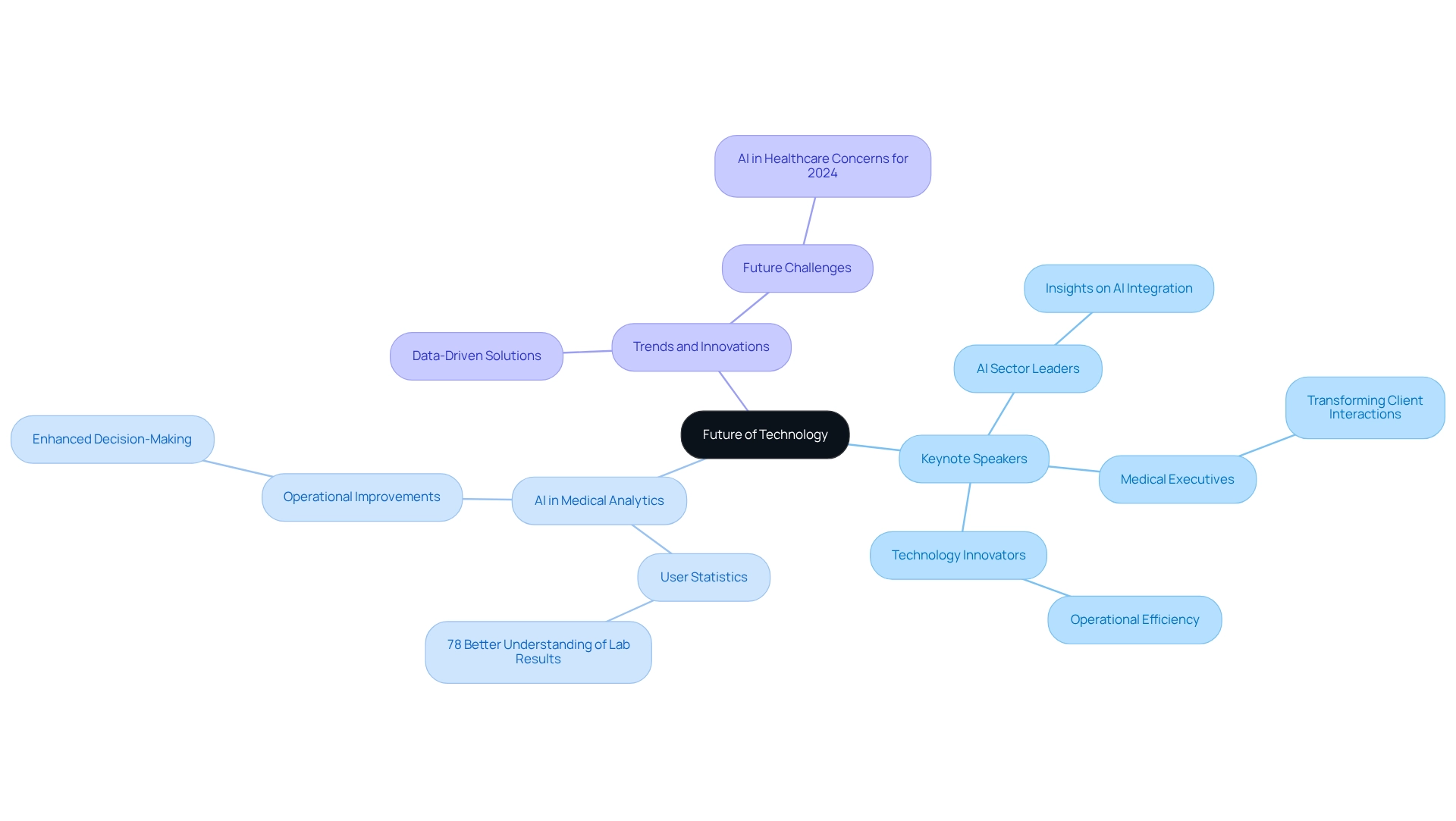
Networking Events: Building Connections with Industry Leaders
The Las Vegas technology convention featured networking events that served as a crucial platform for attendees to forge connections with industry leaders and peers. At the Las Vegas technology convention, these sessions not only facilitated discussions on best practices and emerging technologies but also encouraged collaborative projects that can significantly enhance engagement strategies. Participants shared innovative concepts and explored potential collaborations, particularly in the field of medical analytics. This emphasis on relationship-building underscores the critical importance of collaboration in advancing medical innovation and improving patient outcomes.
Statistics indicate that effective networking can lead to substantial progress in medical technology, with many professionals acknowledging that their current positions were shaped by relationships formed at such events. Notably, a statistic from HubSpot reveals that one in four professionals does not engage in networking at all, highlighting the missed opportunities for those who refrain from participation. Furthermore, Jobvite notes that 18% of workers have secured their current positions through friends or former colleagues, emphasizing the significance of connections in career advancement.
Additionally, smaller meetings often yield greater benefits for networking than larger gatherings, providing attendees with actionable insights on optimizing their networking efforts. A case study exemplifying successful networking is GlobalFoundries’ partnership with Greenough Communications, which effectively showcased their leadership role in technology and drove impactful education campaigns. As the industry evolves, the importance of these interactions cannot be overstated; they lay the groundwork for future innovations and partnerships.
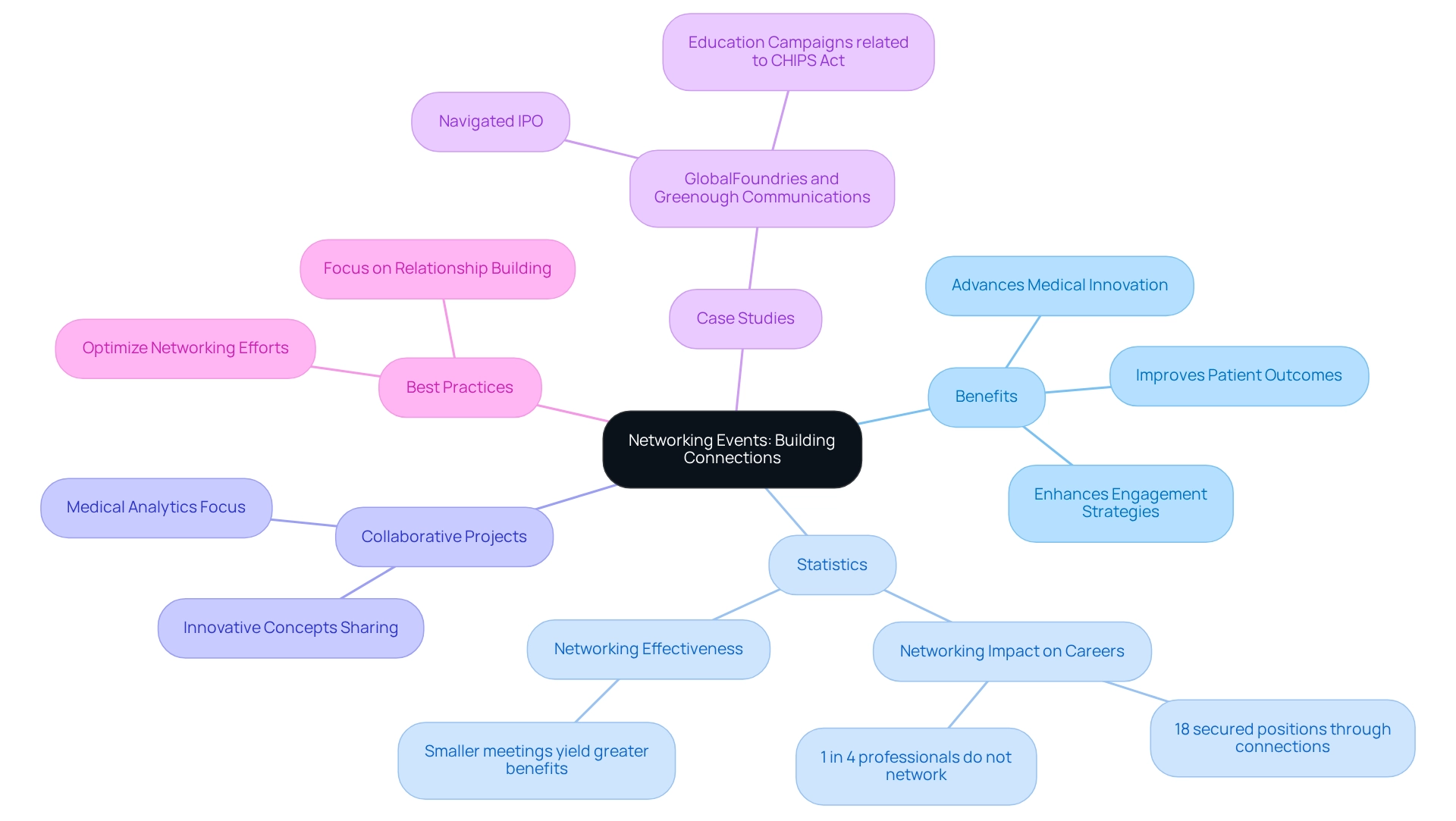
Interactive Workshops: Hands-On Learning Experiences
The Las Vegas technology convention showcased a variety of interactive workshops designed to provide hands-on learning experiences. Participants had the opportunity to engage with advanced technologies and tools pertinent to medical analytics, such as visualization software and AI-driven analytical platforms, at the Las Vegas technology convention. The workshops held at the Las Vegas technology convention not only enhanced participants’ technical skills but also promoted collaborative problem-solving, empowering attendees to apply their knowledge in real-world scenarios. This experiential learning approach is vital for professionals attending the Las Vegas technology convention who want to stay competitive in the rapidly evolving tech landscape.
Statistics indicate that hands-on workshops significantly improve learning outcomes, with:
- 84% of employees in high-performing organizations receiving essential training
- Just 16% in lower-performing companies.
Moreover, the medical technology design program has catalyzed the launch of 24 new companies, highlighting the innovation spurred by such workshops. As the medical sector increasingly adopts information visualization software, the emphasis on interactive workshops becomes even more pronounced, ensuring that professionals are equipped with the necessary skills to navigate the complexities of health analytics effectively.
By integrating CareSet’s extensive medical data expertise into these workshops, participants can further enhance their learning experience and empower their organizations with data-driven strategies. As Gabriela Morgenshtern, Co-Chair of the convention, remarked, ‘We’re looking forward to seeing you in Vienna!’ This sentiment underscores the ongoing commitment to advancing skills and career prospects through effective training programs, and we encourage attendees to explore how CareSet’s insights can contribute to their success.
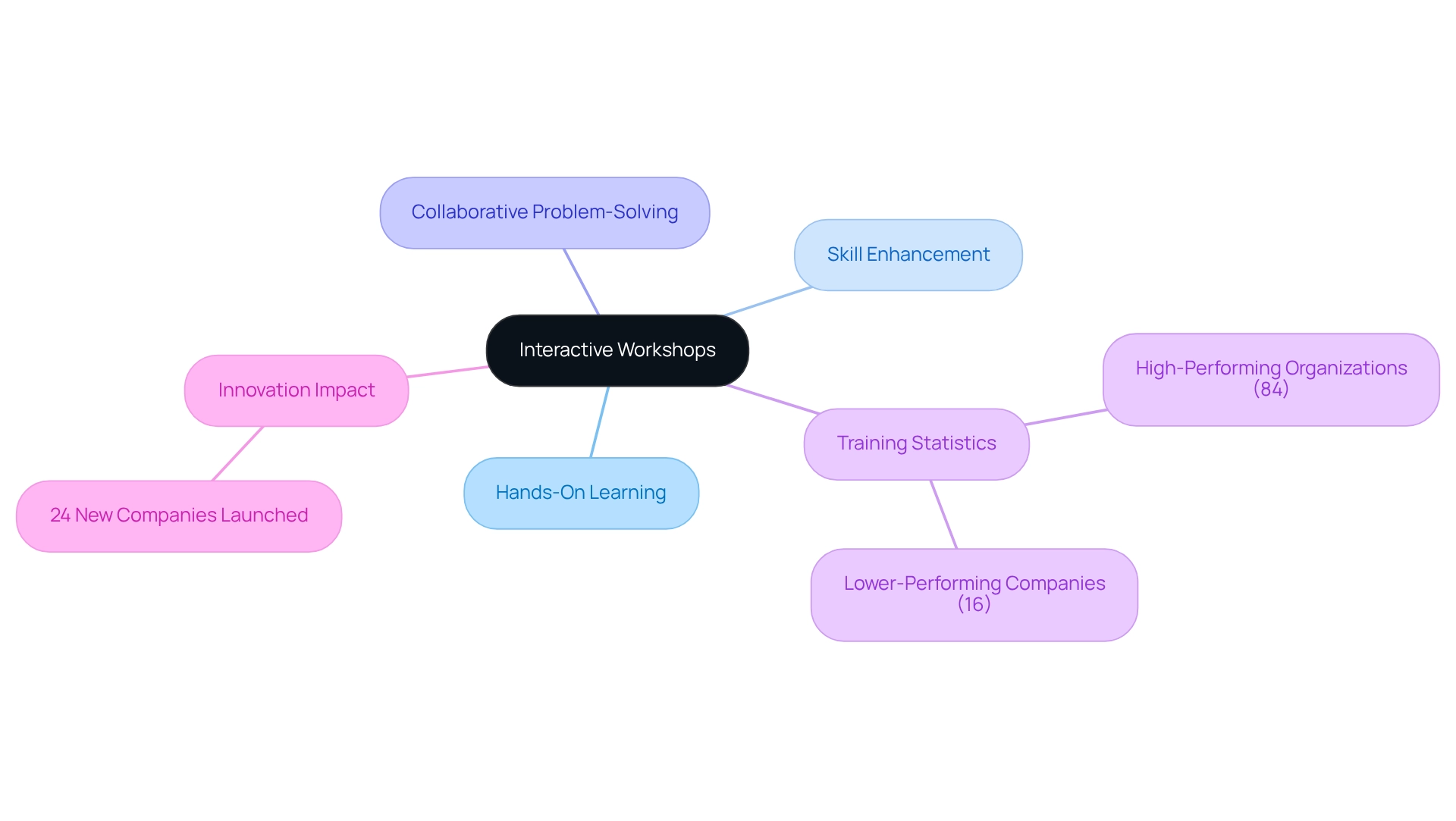
Exhibitor Showcases: Discovering Cutting-Edge Technologies
The exhibitor showcases at the convention emphasized an impressive array of innovative technologies poised to transform medical services. Businesses unveiled revolutionary innovations in telehealth, AI analytics, and healthcare management systems, allowing participants to engage directly with these advancements. This hands-on experience is crucial for medical professionals aiming to implement solutions that enhance outcomes for individuals and improve operational efficiency.
Recent statistics reveal that 27% of patients now feel more comfortable with telemedicine following the COVID-19 pandemic, underscoring the increasing acceptance of these technologies. Moreover, the integration of AI in telehealth is becoming increasingly significant, with expert opinions suggesting that as these technologies evolve, they will play a vital role in modern medical service provision. Kacper Rafalski, Digital Marketing Manager, noted, “As these technologies evolve and adoption obstacles decrease, we can anticipate AI in telehealth to become an increasingly essential part of contemporary medical service provision.”
Furthermore, an impressive statistic indicates that AI analytics can achieve 92% accuracy in identifying early indicators of Alzheimer’s disease through MRI analysis, showcasing the capabilities of these technologies in management systems. This aligns with the case study presented by CareSet, which emphasizes the importance of utilizing Medicare data to empower medical providers in making informed treatment decisions, particularly in oncology. CareSet’s findings illustrate how data-informed insights can enhance engagement with medical providers, ultimately improving patient outcomes.
Case studies presented at the convention illustrated the regional variations in telehealth adoption, with 40% of adults in northern states and 42.4% in western states utilizing telehealth services. These observations highlight the diverse landscape of telehealth utilization across the United States, emphasizing the need for tailored strategies in different regions. The significance of standardized outcome measurements, including HEDIS metrics, was also underscored, providing a framework for assessing telehealth success across various health domains.
Overall, the Las Vegas technology convention served as a pivotal platform for showcasing telehealth innovations and AI analytics, equipping medical professionals with the knowledge and tools necessary to navigate the evolving medical landscape effectively. Attendees departed with actionable insights on how to implement these technologies in their practices, reinforcing the critical role of data leadership in enhancing provider engagement.
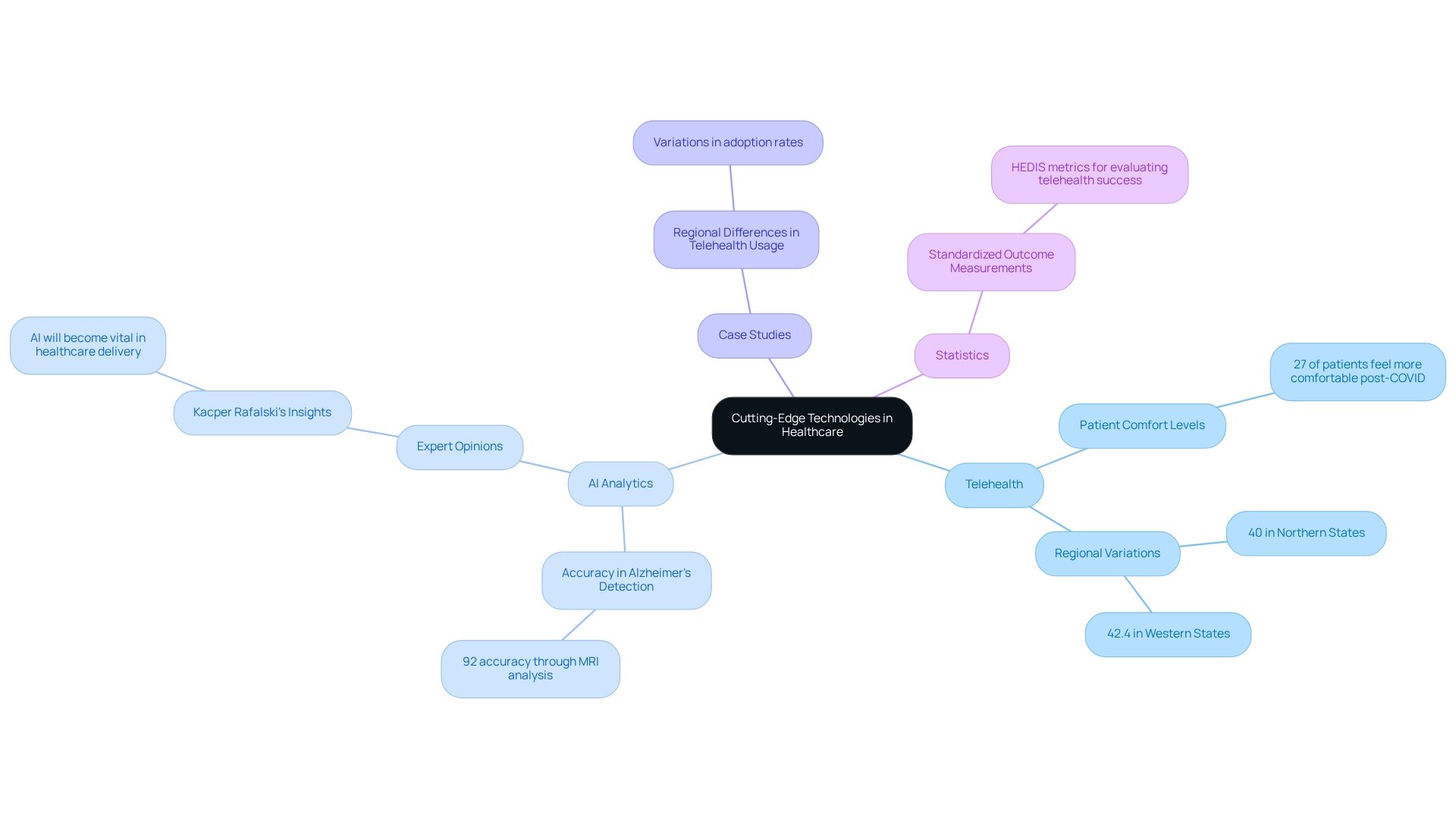
Expert Panels: Insights on Current Technology Trends
Expert panels at the Las Vegas technology convention convened leading voices to explore pivotal technology trends that are reshaping the healthcare sector. Discussions centered on the burgeoning role of AI in patient care, with statistics indicating a remarkable 300% growth in AI-powered mental health applications since 2020, as highlighted in the case study titled “Growth of AI in Mental Health Applications.” This underscores AI’s potential to enhance accessibility and effectiveness in managing mental health issues.
Furthermore, panelists addressed urgent privacy concerns, revealing that 68% of U.S. adults worry that AI could weaken the patient-provider relationship, according to Statista 2024. This highlights the pressing need for transparency and trust in AI applications. Additionally, 23% of U.S. adults believe AI chatbots should be accessible to all, even if they are not presently consulting a therapist, illustrating the diverse public views on AI in medical services.
The incorporation of blockchain technology was another central aspect, with specialists promoting its application in safeguarding health records and ensuring information integrity. This method not only improves individual privacy but also simplifies administrative procedures, enabling staff to focus on client-facing tasks, thereby enhancing overall efficiency.
Moreover, discussions highlighted the significance of utilizing extensive Medicare data to examine treatment pathways and provider interventions, which can greatly guide strategic decision-making for pharmaceutical market access managers.
Attendees of the Las Vegas technology convention departed with a thorough understanding of the challenges and opportunities posed by these technological advancements, emphasizing the necessity for medical organizations to remain flexible and innovative in this rapidly evolving landscape. To leverage these insights, pharmaceutical market access managers should consider incorporating AI and blockchain solutions into their strategic initiatives to enhance user engagement and operational efficiency.
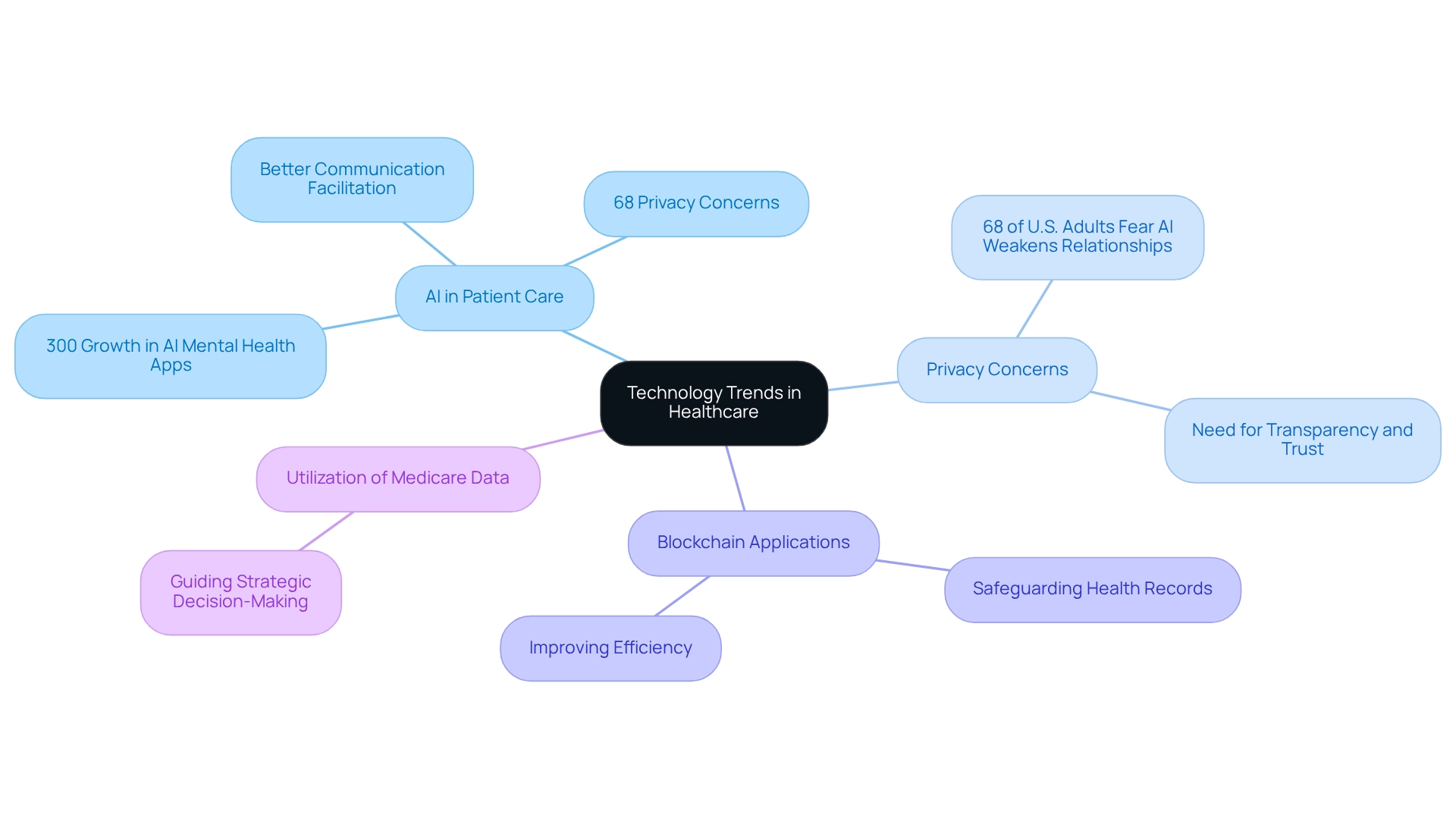
Regulatory Sessions: Navigating Changes in Technology Compliance
Regulatory sessions at the convention examined the evolving compliance landscape for technology in the medical field, addressing critical regulatory changes that impact data security and patient privacy. Notably, experts underscored the necessity of adapting to these shifts, revealing that:
- 88% of executives acknowledge the importance of measuring cyber risk, yet only 15% implement substantial measures to do so.
- A significant investment trend emerged, with an anticipated 50% increase in tools for compliance and safety within legal departments by 2026, underscoring the growing importance of compliance investments in the medical sector.
Attendees gained valuable insights into best practices for ensuring compliance while effectively leveraging emerging technologies. With 40% of supply chain experts emphasizing risk management and resilience, this understanding is crucial for medical organizations aiming to innovate responsibly while maintaining trust with patients and regulators. As highlighted by Navex Global, over half of compliance and risk experts consider managing privacy (53%) and IT/information security risk (52%) essential for their organizations.
Case studies, such as those showcasing Secureframe’s compliance automation, demonstrated that 97% of users improved their security posture, illustrating effective strategies for navigating the complexities of technology compliance in the medical sector. As we approach 2025, grasping these regulatory changes is vital for safeguarding individual information and ensuring organizational integrity. To act on these insights, medical organizations should prioritize investments in compliance tools and develop robust strategies that align with emerging regulatory requirements.
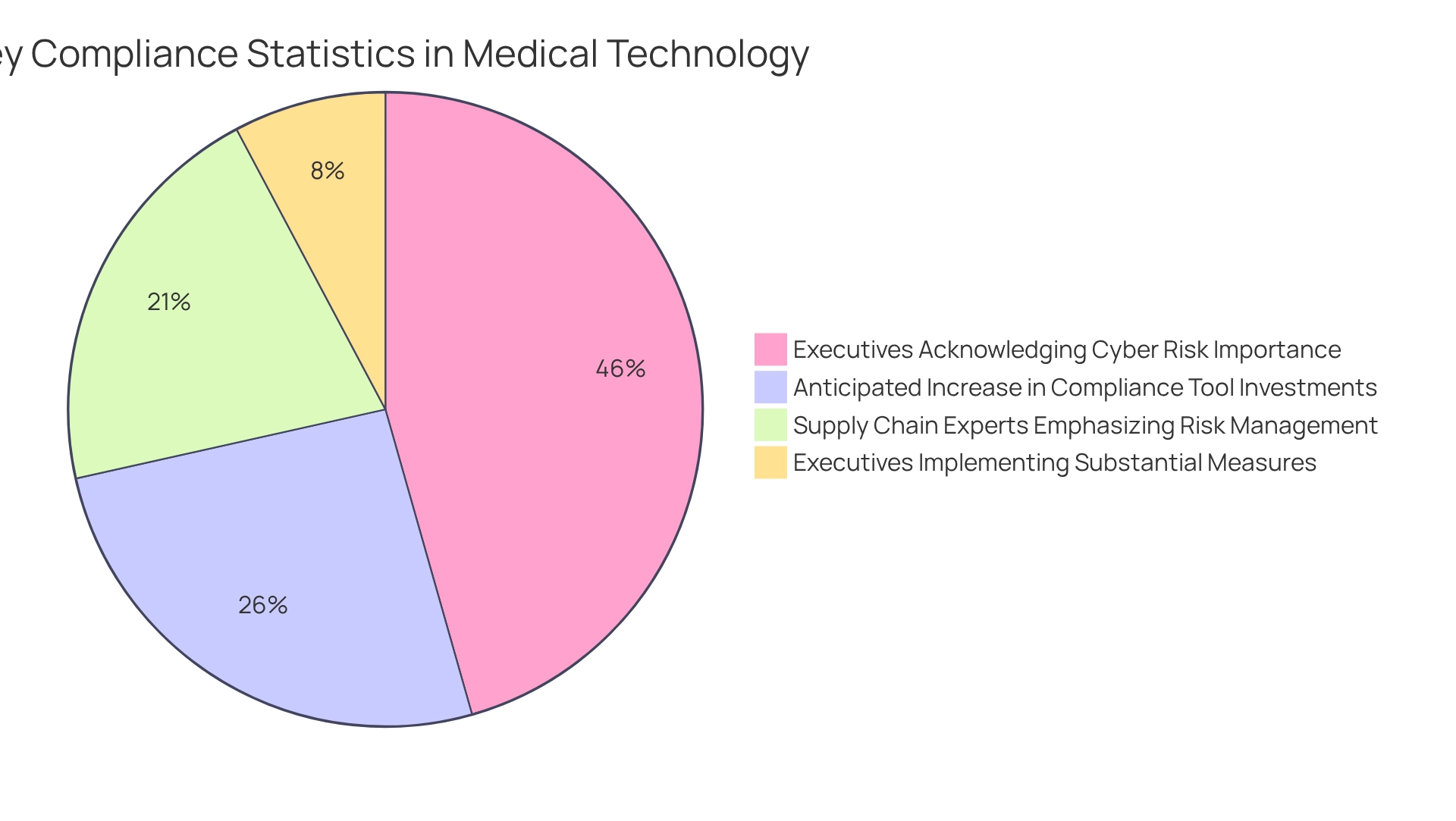
Startup Pitches: Exploring Innovative Solutions
The startup pitch sessions emerged as a dynamic platform for innovative companies to unveil their groundbreaking solutions before a panel of judges and an audience of industry professionals. Startups showcased a diverse array of technologies, including AI-driven client engagement tools and advanced data analytics platforms. These presentations not only illustrated the creativity of new participants in the medical technology field but also underscored the growing trend of leveraging artificial intelligence to enhance user interactions and outcomes in 2025.
Statistics reveal that nearly three times as many startups exist in the United States compared to the total of the next ten nations, emphasizing the competitive landscape for medical innovations. Furthermore, approximately 70% of medical startups are concentrating on AI-driven solutions, reflecting a substantial shift toward technology that personalizes patient engagement. This trend is further supported by expert insights that highlight the crucial role of startups in revolutionizing medical service delivery through inventive solutions.
In this context, CareSet’s comprehensive Medicare information solutions stand out as an essential resource for pharmaceutical and biotech companies. With insights derived from over 62 million beneficiaries, 6 million providers, and more than $900 billion in claims annually, CareSet empowers stakeholders in the medical field to make informed decisions that enhance care quality and foster business success. The 14+ years of claims data available through CareSet enrich these insights, facilitating a deeper understanding of treatment patterns and individual needs.
The enthusiasm generated during these sessions inspired established companies to explore potential partnerships and investments in these pioneering technologies. Notable examples include collaborations formed from previous conventions, where startups successfully aligned with larger firms to amplify their market reach and operational capabilities. As Rituparna, a writer at WinSavvy, remarked, “Age is one of those things people love to talk about when it comes to startups,” highlighting the youthful energy and innovative spirit propelling these companies forward.
Additionally, pilot programs and direct-to-consumer strategies were discussed as effective methods for startups to gain traction and solicit feedback in the market. As the medical landscape continues to evolve, the innovative solutions presented at these pitches, combined with CareSet’s actionable insights that address market research challenges and support pharmaceutical lifecycle management, are poised to play a pivotal role in shaping the future of care.
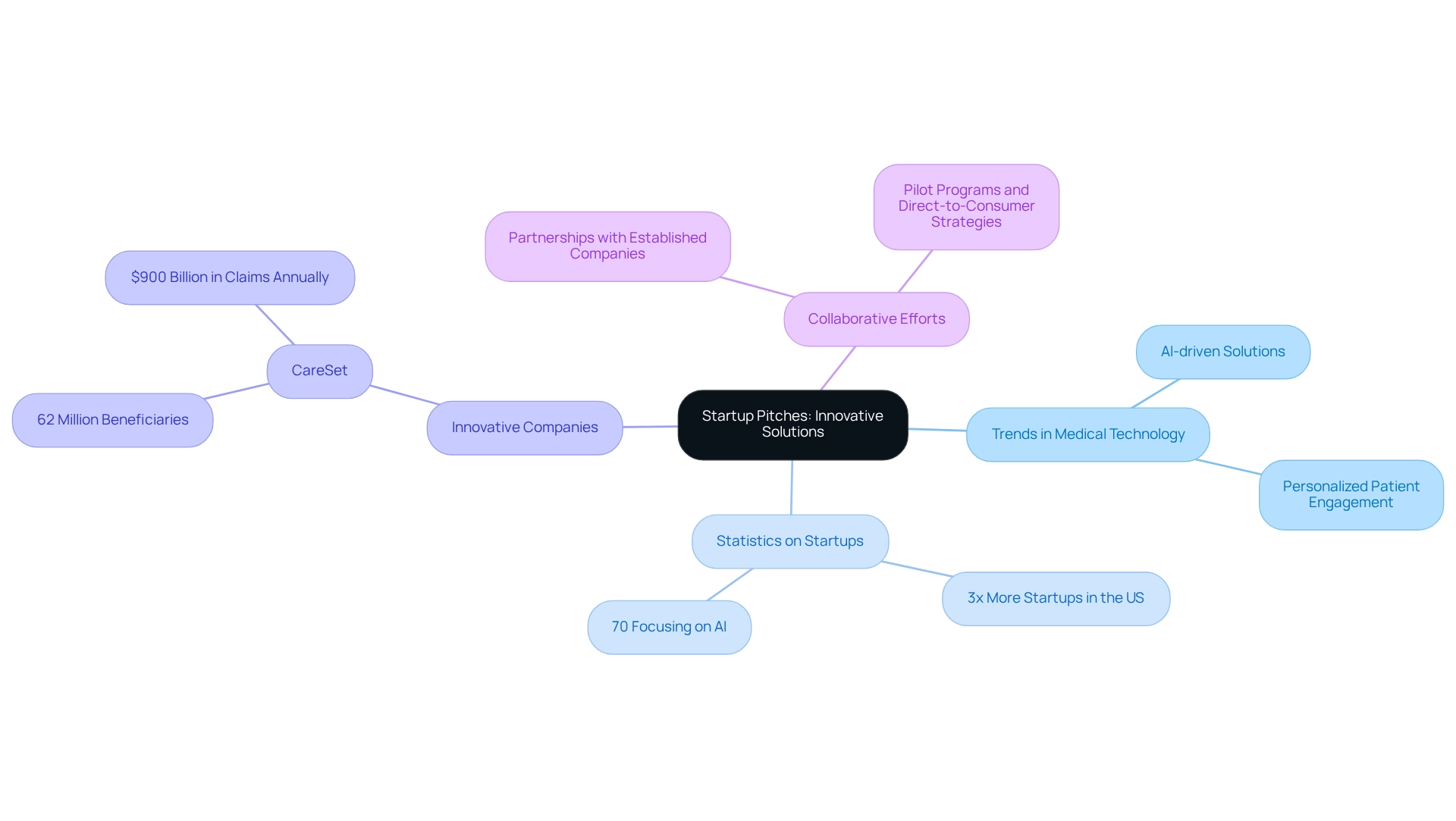
Case Studies: Learning from Successful Technology Implementations
Case studies presented at the Las Vegas technology convention showcased successful technology implementations that significantly transformed medical environments. These examples demonstrated how organizations utilized analytics, particularly through innovative Medicare information solutions by CareSet, to improve patient outcomes, streamline operations, and refine decision-making processes. One case study emphasized the application of AI and natural language processing (NLP) to automate the extraction and cleaning of unstructured medical information, leading to enhanced information quality and diminished manual effort in analysis. This aligns with CareSet’s commitment to addressing the challenges of unstructured and low-quality information, a prevalent concern in medical analytics since its establishment in 2011.
Statistics indicate that healthcare systems employing analytics, particularly those using information from CareSet’s extensive Medicare solutions, have experienced a significant enhancement in outcomes for individuals. Numerous organizations have reported improved operational efficiency and reduced risks. Research suggests that organizations utilizing data analytics have enhanced health outcomes by as much as 30%, underscoring the tangible benefits of these technologies. Participants gained valuable insights into the strategies employed and the challenges encountered during these implementations, equipping them with practical knowledge for their own organizations.
As Dmytro Tymofiiev, Delivery Manager at SPD Technology, pointed out, “Healthcare analytics grounded in data-driven knowledge is utilized for forecasting events and risks, demographic analysis of individuals, real-time monitoring via IoT devices, operational enhancement, as well as fraud detection.” Learning from these successes is essential for fostering innovation and advancing healthcare delivery, ultimately leading to better patient care and outcomes. To leverage this knowledge effectively, organizations should consider establishing a systematic approach to data analytics that includes regular training and updates on best practices.
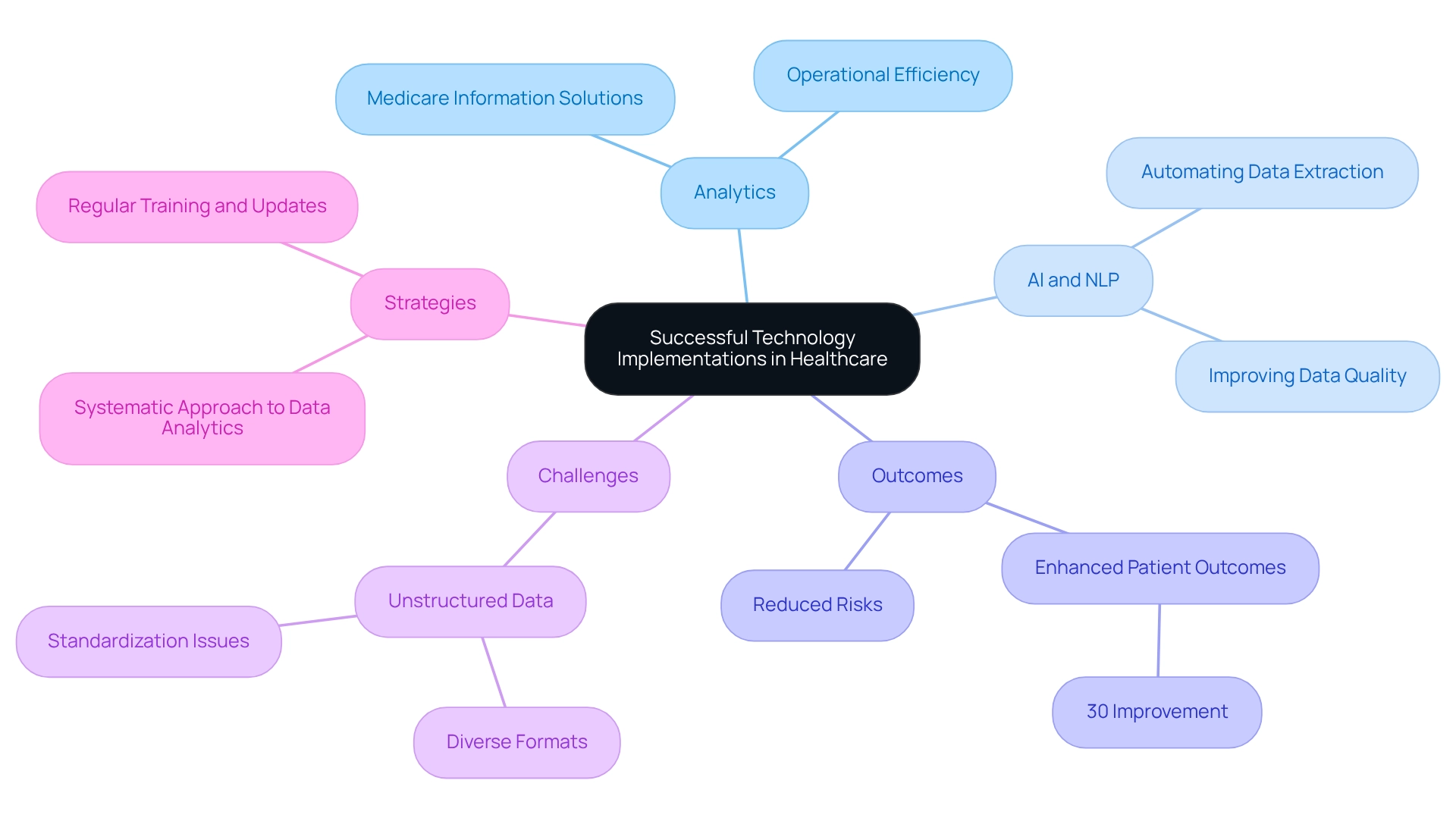
Closing Remarks: Key Takeaways and Future Directions
The closing remarks of the convention encapsulated pivotal themes and insights shared throughout the event. Speakers emphasized the essential role of innovation, collaboration, and adaptability in navigating the swiftly changing medical landscape. Notably, 75% of hospitals now offer mobile applications for patient access, underscoring the importance of leveraging technology to enhance patient engagement. Furthermore, customized treatment expenses are reported to be 6.6% lower than conventional methods, highlighting the economic advantages of innovation in the medical field. Attendees were urged to utilize the knowledge gained to drive improvements within their organizations and to remain vigilant about emerging technologies and regulatory changes.
As the medical sector prepares for significant advancements in 2025, the emphasis on strategic thinking and proactive engagement is paramount. Expert opinions highlighted that the medical field has only begun to explore the potential of artificial intelligence for customization and efficiency. Russ Teicheira stated, “The medical world has only scratched the surface of what artificial intelligence can do for customization and efficiency,” suggesting a transformative future ahead. Moreover, the U.S. government’s recent initiatives in digital wellness, aimed at optimizing digitized medical delivery, further emphasize the significance of collaboration and innovation in the medical technology landscape.
In this context, CareSet’s extensive Medicare data analyses and analytics solutions emerge as essential tools for stakeholders. These resources enable stakeholders to utilize information from over 62 million beneficiaries and 6 million providers. Stakeholders are encouraged to remain updated with CareSet’s most recent information and tools to enhance their medical strategies. The insights shared at the Las Vegas technology convention serve as a call to action for stakeholders to embrace these changes and foster a culture of innovation in healthcare technology. By leveraging data-driven strategies, they can enhance patient outcomes and drive success.
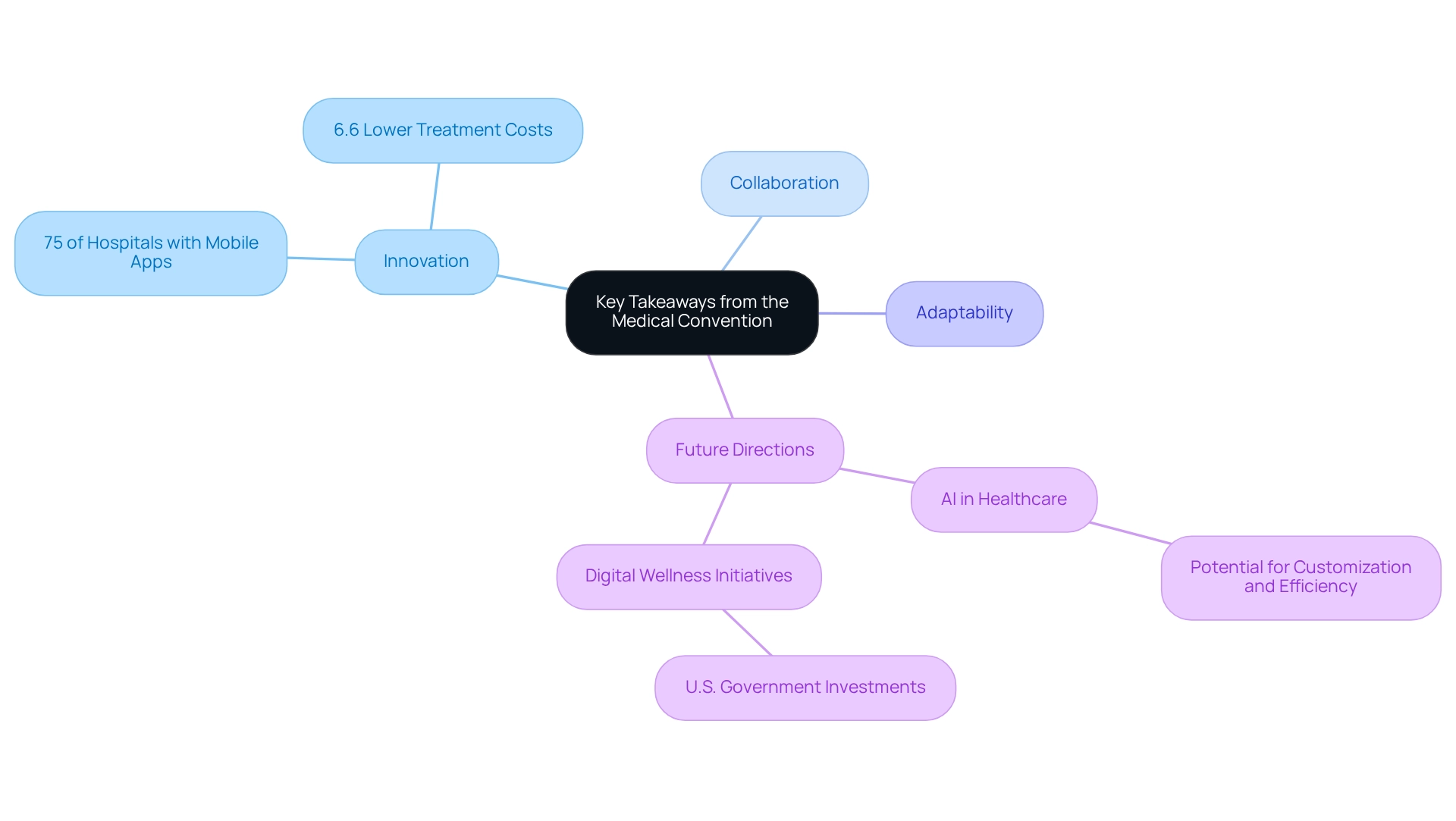
Conclusion
The Las Vegas Technology Convention has highlighted the transformative potential of healthcare analytics, particularly through the lens of Medicare data insights provided by CareSet. By analyzing over $1.1 trillion in annual claims data, stakeholders can uncover critical treatment patterns and gaps in care, which enhances patient outcomes and informs strategic decision-making. The discussions at the event underscored the vital role of artificial intelligence and data analytics in revolutionizing patient engagement and operational efficiency, as well as the importance of collaboration among industry leaders to drive innovation in healthcare.
Networking opportunities at the convention facilitated the exchange of ideas and partnerships, emphasizing that collaboration is key to advancing healthcare technology. The hands-on workshops and exhibitor showcases equipped attendees with practical tools and knowledge necessary to navigate the complexities of healthcare analytics and implement cutting-edge solutions. Case studies presented illustrated successful technology implementations, reinforcing the benefits of leveraging data-driven insights to improve patient care and operational effectiveness.
As the healthcare landscape continues to evolve, the insights gained from the convention serve as a crucial reminder for organizations to remain adaptable and proactive. The emphasis on compliance, regulatory changes, and the integration of emerging technologies underscores the importance of strategic planning in this dynamic environment. Stakeholders are encouraged to embrace the innovations discussed, utilizing comprehensive Medicare data insights to enhance their healthcare strategies and ultimately improve patient outcomes. The future of healthcare technology is bright, and it is essential for all involved to leverage these advancements to foster a culture of continuous improvement and innovation.


